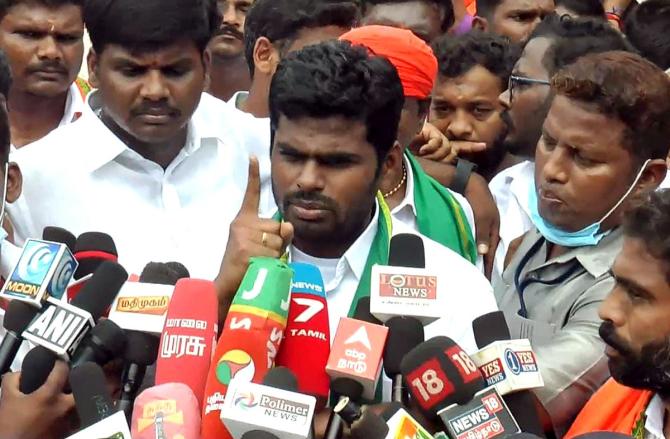Independent of the political fallout, which Stalin has sought to arrest through the withdrawal of the measures as fast as they were introduced, there are concerns about the way those decisions came to be taken, without adequate application of mind, not in official terms but in political and electoral contexts, points out N Sathiya Moorthy.

At a time when pro-Dravida Munnetra Kazhagam social media enthusiasts had succeeded in making light of state Bharatiya Janata Party president K Annamalai's long list on the wealth of party leaders, including ministers, the Stalin government's two quick and successive decisions, and their equally fast withdrawal, have embarrassed the chief minister a year ahead of the crucial Lok Sabha polls.
Coming as they did in the midst of an audio-record controversy involving Finance Minister Palanivel Thiaga Rajan and income-tax raids on the construction company G-Square -- allegedly linked to Stalin's son-in-law Sabareesan -- the two governmental decisions have 'exposed' the DMK government's policy on the all-important liquor and labour fronts.
Of the two governmental faux pas, one was a gazette notification, on issuing short-term liquor permits at sports stadia and wedding functions. The notification was dated April 18 when the state assembly was having its budget session, but the House was not taken into confidence. That was only one part.
The larger issue is that since the days of late All India Anna DMK chief minister J Jayalalithaa's last assembly polls in 2016, the DMK, then in the Opposition, had been supporting 'popular protests' for a total shutdown of liquor shops.
More importantly, during the budget session, the government had promised to shut down 500 more liquor shops, an initiative begun by Jayalalithaa, to assuage popular sentiment, with a promise to end all liquor sales in the state in due course.
The gazette notification made a mockery of the government's announcement in the assembly and also the larger public expectations for a liquor-free Tamil Nadu, as had existed before 1971.
Unlike this one, the controversy over extension of daily working hours from eight to 12 in select sectors and industries owes also to the lack of application among assembly members. The government had placed the draft bill for the purpose on the table of the House days earlier, but no one, either from the ruling coalition or the political Opposition possibly read it until the morning of the concluding day of the budget session, when the draft was taken up for debate and voting.
The DMK's electoral allies from 2019 and 2021 staged a walkout after their suggestion for referring the Bill to a select committee did not find favour with the government. The Opposition AIADMK had already walked out, as has become the norm for the non-ruling Dravidian major to do when not in power.
When the ruling party MLAs cleared the amendment bill by voice vote, the BJP legislators too were inside the House.
As is known, the Narendra Modi government at the Centre has already passed the new labour code in Parliament, which unions say is 'anti-labour'. This did not get enough publicity though it does not also mean that the DMK and the BJP are coming closer, better still forming an alliance for elections 2024.
It is another matter Stalin was not present in the House when the vote was taken.
Of significance is the fact that the assembly passed the controversial piece of legislation/amendment only days before May Day, which is commemorated year after year, to respect labour rights.
Pre-Independence, it was labour leaders like Singaravel and Thiru V Kalyanasundaram (ThiruViKa), a Tamil scholar in his right, both from Chennai, who had laid the foundation for a strong trade union movement in the country. Hence, critics of the new measure dubbed it as a betrayal of those great leaders and their contributions to obtaining labour rights at a very difficult time in the nation's history.
What is of greater significance is the way the government did a U-turn on both decisions. The chief minister himself announced that the government would hold the 12-hour law in abeyance. He did not clarify if it would be considered at a later date, or if the government would continue with the conversations it had to initiative with stake-holders after the labour and public mood became known.
The government also readily withdrew the liquor order, as it promised to be a sure-fire election issue next year.
Since before the 2016 assembly elections that Jayalalithaa won for a second successive term, total prohibition had captured the imagination of women folk in the state. The DMK, then in the Opposition, had supported the cause and promised full prohibition ahead of the 2021 assembly elections.
The new gazette notification was dated April 18, when the assembly was in session. But no one took notice until the official announcement was out a day after the budget session's conclusion.
The greater irony was that during the session, the government had declared that it would shut down another 500 liquor shops, in line with Jayalalithaa's commitment to effect total prohibition in a calibrated way.
The Stalin government too had shut down 500 Tasmac shops, as the government-run liquor shops are known.
Incidentally, Tamil Nadu is the only state where the government is involved in liquor sales, and public sector corporation, Tasmac, is the monopoly-trader.
The scheme was introduced by the Jayalalithaa government in her second term (2001-2006), as she discovered that there was more money in the liquor business, which licensed shop owners in the private sector were raking.
After all, the argument went, the government needed all the money it could amass, for development projects and multiple social welfare schemes, which Stalin calls the 'Dravidian model'.
Independent of the political fallout, which Stalin has sought to arrest through the withdrawal of the measures as fast as they were introduced, there are concerns about the way those decisions came to be taken, without adequate application of mind, not in official terms but in political and electoral contexts.
This gives rise to the question how attentive and serious are the state ministers and their senior aides when proposals of the kind are presented in the cabinet for prior approval or such other papers are sent to them for inputs and recommendations.
In particular, the issue has shown up the possibility that ministers had routinely cleared proposals put up by their bureaucratic aides, whatever impact they may have on the ruling party's policies, politics and electoral chances.
It may be time that Stalin identified the loopholes, of which these are only the more recent ones, and fix them -- one, to ensure that the government machinery functions smoothly and two, the ruling party's electoral chances are not affected.
The reasons are not far to seek. Even as the Opposition AIADMK is still caught in the post-Jayalalithaa leadership transition and family feuds, legal and political, the BJP ruling the Centre is getting increasingly agitated.
After state BJP boss Annamalai came up with a list of DMK leaders, including ministers, and their money-worth, the party has submitted a memorandum to governor R N Ravi, on the Rs 200-crore corruption charge against Stalin, when he was deputy chief minister under late CM-father, M Karunanidhi.
This has since been followed by IT raids on a private construction company, G Square in which a ruling party MLA, Mohan, has interests and Stalin's son-in-law Sabareesan too is alleged to have a silent presence. The company has since strongly denied all such suggestions, after the old rumours began reappearing in the social media.
As may be recalled, ahead of the last elections, the IT raided Sabareesan, but returned empty-handed -- but not before Sabareesan had obtained a clean -chit from them in writing. Without reference to the same, G Square has now claimed that the IT raids would clear its name (likewise).

The latest in the series that BJP's Annamalai has titled as 'DMK Files' are two audio-tapes, tweeted within a few days' gap. Annamalai claimed that they were the voices of nationally popular Tamil Nadu Finance Minister Palanivel Thiagarajan.
In the first tape, the 'PTR voice' is talking about corruption involving members of the party's 'first family'.
In the second, the voice compares the DMK with the BJP, and praises how the latter has adopted the one-man-one-post norm effectively.
Thiaga Rajan issued a two-page statement with his tweet claiming specific interpolations. He is yet to issue a denial on the second tape. But the delay with regard to his first denial caused eyebrows to raise both outside and more inside the party.
If the explanation is that he took time for expert audio verification to locate interpolations that made them sound genuine, neither he nor the party has not explained it.
In particular, the party did not defend PTR in this instance. It is another matter of those ministers and leaders who had been listed in Annamalai's inaugural 'DMK Files', some have since served legal notice on the BJP leader to retract or face legal action.
Denying Annamalai's charge that Stalin as deputy chief minister in 2011 under his CM-father M Karunanidhi had taken Rs 200 crores in bribes through two shell companies overseas, the DMK as a party asked him to retract or face a defamation case for Rs 500 crores.
Seemingly unperturbed, the politician that he has become, Annamalai stuck to his guns, and said that he would counter-sue DMK leader R S Bharati with a suit for Rs 500 crore+1.
Opinion is divided within the DMK if the government should have initiated criminal defamation case(s) against Annamalai, as per the precedent set by Jayalalithaa as CM.
Barring the last two stints in office, 2011-2016, Jaya used to have the state government initiate criminal action under the Indian Penal Code against journalists, editors and politicians from across the country, whenever she was in power.
It meant that those from outside Chennai would have to be around for preliminary hearings, which could be adjourned owing to time factor. They needed to be represented by lawyers, which added to the costs, for publications, publishers, editors and reporters -- and, of course, politicians who were similarly arraigned.
The idea was to harass all critics of Amma, nothing more, as after some time, either at the intervention of the higher judiciary or owing to change of government, those cases would be withdrawn, one way or the other.
To the extent Stalin has drawn the line between individuals, party and government there is appreciation in select circles. The rest have not noticed the distinction he is trying to draw. Beyond that however, the faux pas in the government has taken a huge hit for its clumsy handling of the twin issues of the Factories Act amendment and liquor permits for sports events.

The near-simultaneous release of Annamalai's DMK Files, tax raids and the PTR audio-tapes have all added to popular excitement.
While there is apprehension about the course of things to come, the fate of similar raids across the country since the Modi government came to power in 2014, and the non-conclusion of any court cases in any of them, apart from the resultant perception that it is 'political vendetta' after all have dominated the social media discourse.
In the midst of this is also the fact that Tamil Nadu is not new to political corruption of the highest order and at highest places.
In recent times, Jayalalithaa faced the disproportionate assets case, in which a Bangalore trial court sentenced her to four year prison term and Rs 100 crore (Rs 1 billion) in fine. She passed away before the Supreme Court upheld the trial court verdict, reversing the Karnataka high court's acquittal order.
The fact that the Supreme Court upheld the trial court's verdict in its entity implied that if alive, Jayalalithaa would have faced the same fate.
What more, to recover the Rs 100 crore fine, which remained even after Jaya's death, her properties, including her Poes Garden residence in Chennai, were attached.
All of it says a lot, as long as -- and only if -- private initiators of corruption cases (this one by BJP leader Subramanian Swamy, then heading the Janata Party) and the governments that step in, continue to pursue court proceedings at different levels and stages with determination.
This seems to be lacking in the case of the raids across the country under the Modi regime.
N Sathiya Moorthy, veteran journalist and author, is a Chennai-based policy analyst & political commentator.










